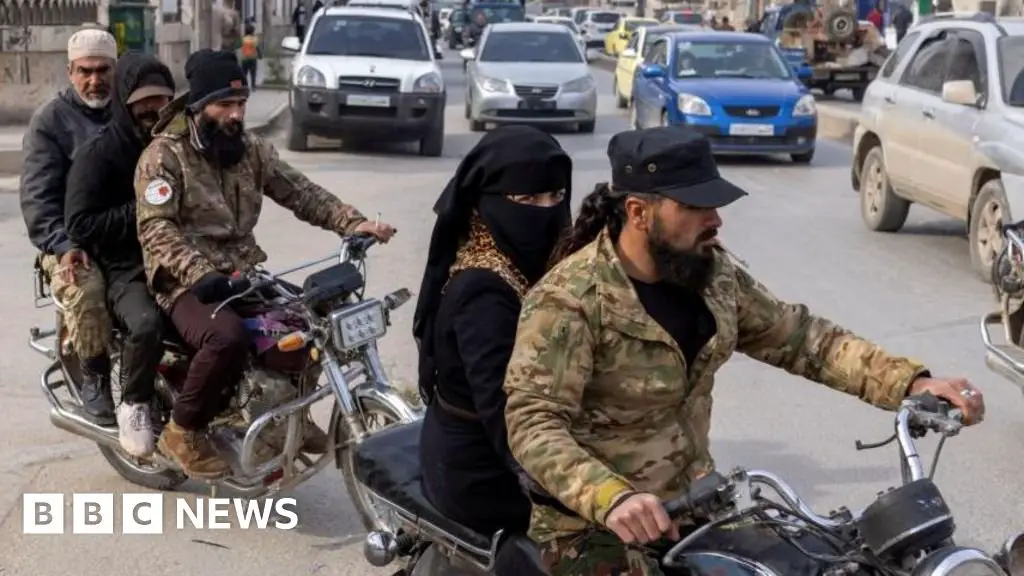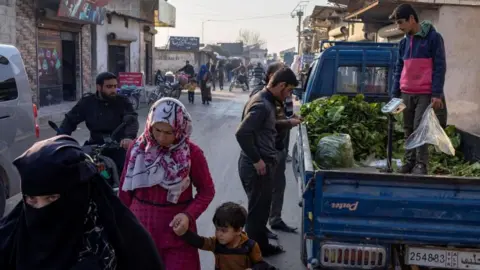 Reuters
ReutersThe road to Idlib, a remote corner of northwest Syria, still bears the signs of the old front lines: trenches, abandoned military positions, rocket-propelled grenades and ammunition.
Until just over a week ago, this was the only opposition-controlled area in the country.
From Idlib, rebels led by the Islamist group Hayat Tahrir al-Sham (HTS) launched a stunning offensive that toppled Bashar al-Assad and ended his family’s five-decade dictatorship in Syria.
As a result, they have become the country’s de facto authorities and appear to be trying to spread their way of governing to the rest of Syria.
In Idlib city center, opposition flags with a green stripe and three red stars flew high in public squares, waved by men and women, old and young, following Assad’s overthrow. Graffiti on walls celebrated resistance to the regime.
While destroyed buildings and piles of rubble served as a reminder of the not-so-distant war, renovated homes, recently opened businesses, and well-maintained streets showed that some things had actually improved. However, there were complaints about what the authorities perceived as heavy-handed rule.
When we were there earlier this week, the streets were relatively clean, traffic lights and lampposts were working, and officers were present in the busiest areas. Simple things are missing in other parts of Syria and are a source of pride here.
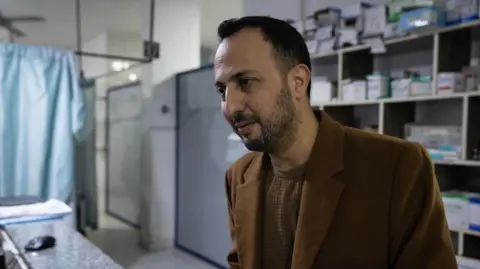 Lee Durant/BBC
Lee Durant/BBCHTS has its origins in al-Qaeda, but in recent years has actively sought to transform itself into a nationalist force, moving away from its jihadist past and intent on toppling Assad.
As the militants marched on Damascus earlier this month, their leaders spoke about building a Syria for all Syrians. However, it is still designated a terrorist organization by the US, Britain, the United Nations and others, including Turkey, which supports some Syrian rebels.
The group took control of most of this region, home to 4.5 million people, in 2017, bringing stability after years of civil war.
The administration, known as the Salvation Government, handles water and electricity distribution, garbage collection and road surfacing.
Taxes collected from businesses, farmers and border crossings with Turkey fund their public services – but also their military operations.
“Under Assad they always said Idlib was the forgotten city,” said Dr. Hamza Almoraweh, a cardiologist, as he treated patients at a hospital housed in an old postal warehouse.
He moved with his wife from Aleppo in 2015 as the war there intensified, but had no plans to return even though the city was under rebel control.
“We have seen great development here. Idlib has many things that were not there under the Assad regime.”
While HTS moderated its tone and sought to gain international recognition against local opposition, it lifted some of the strict social rules it had established when it came to power, including dress codes for women and a ban on music in schools.
And some cite recent protests, including against government-imposed taxes, as evidence that, unlike the Assad repression, a certain level of criticism is tolerated.
“It is not a complete democracy, but there is freedom,” said Fuad Sayedissa, an activist.
“There were some problems in the beginning, but in the last few years they have behaved better and are trying to change.”
Sayedissa is originally from Idlib and now lives in Turkey, where he runs the non-governmental organization Violet. Like thousands of Syrians, Assad’s fall meant he could visit his city again – in his case for the first time in a decade.
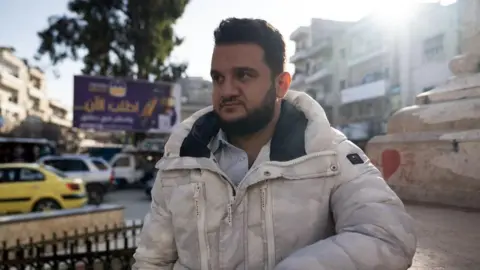 Lee Durant/BBC
Lee Durant/BBCBut there were also demonstrations against what some described as authoritarian rule. To consolidate power, experts say, The group targeted extremists, absorbed rivals and imprisoned opponents.
“How the government will act across Syria is a different story,” Sayedissa said. Syria is a diverse country and after decades of oppression and violence at the hands of the regime and its allies, many are yearning for justice. “People are still celebrating, but they’re also worried about the future.”
We tried to interview a local official but were told they had all gone to Damascus to help with the new government.
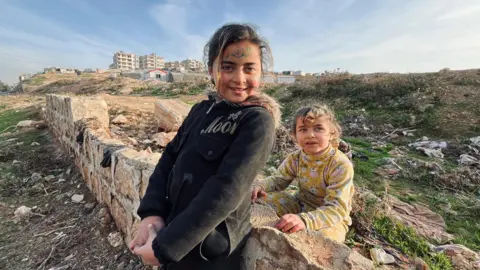 Lee Durant/BBC
Lee Durant/BBCAn hour’s drive from Idlib, in the small Christian village of Quniyah, church bells rang on December 8 for the first time in a decade to celebrate Assad’s ouster.
The community near the Turkish border was bombed during the civil war that began in 2011 when Assad crushed peaceful protests against him and many of its residents fled.
Only 250 people remained.
“Syria is doing better since Assad fell,” said brother Fadi Azar.
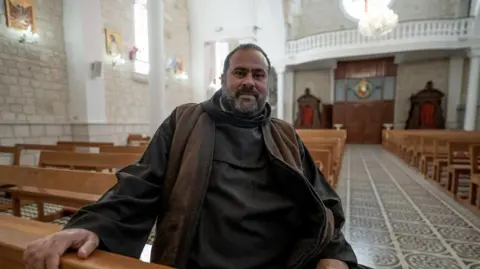 Lee Durant/BBC
Lee Durant/BBCBut the rise of Islamists has raised fears that minorities, including Assad’s Alawites, could be at risk, despite HTS reassuring religious and ethnic groups that they would be protected.
“In the last two years they (HTS) have started to change… Before it was very difficult,” Friar Azar said.
Property was confiscated and religious rituals restricted.
“They gave (our community) more freedom, they called on other Christians who were refugees to come back to take back their land and their homes.”
But is the change real? Can you trust them? “What can we do? We have no other choice,” he said. “We trust them.”
I asked Sayedissa, the activist, why even opponents shied away from criticizing the group.
“They are the heroes now… (But) we have red lines. We will not allow any more dictators, Jolani or others,” he said, referring to Ahmed al-Shara, the HTS leader who gave up his nom de guerre Abu Mohammad al-Jolani after coming to power.
“If they act as dictators, people are willing to say no because they now have their freedom.”


